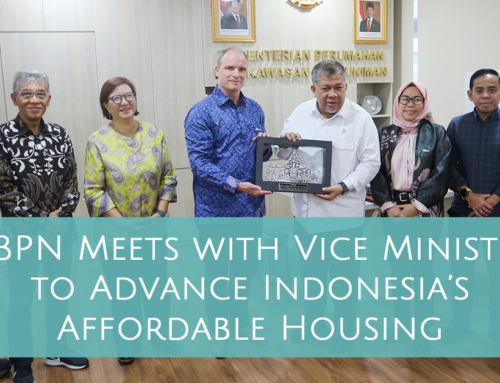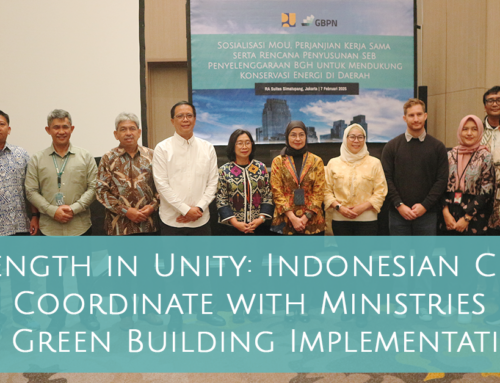GBPN has established a Policy Hub for Sustainable Buildings in Indonesia. The work has now been officially launched following on from a Focus Group Discussion (FGD) held with key experts in late September, 2022.
The Policy Hub will serve as a platform to engage with the national government of Indonesia in a series of dialogues focusing on four thematic areas supporting energy efficient buildings. The goal is to help Indonesia move towards net zero buildings.
The four thematic areas are:
- Policy Opportunities
- Capacity Building and Technical Implementation
- Market Drivers
- Innovation.
 GBPN’s National Strategic Advisor for Indonesia, Ratri Widyadari, said building a hub that convenes government bodies from different sectors was essential as the sustainable buildings agenda requires intervention from various sectors.
GBPN’s National Strategic Advisor for Indonesia, Ratri Widyadari, said building a hub that convenes government bodies from different sectors was essential as the sustainable buildings agenda requires intervention from various sectors.
“Sharing and learning from each other strategy, challenges, and experiences are among the keys of Policy Hub platform,” Ms. Widyadari said. “That is why we kick off the hub through organizing a multi-stakeholder focus group discussion (FGD) with key experts.”
Four Ministries participate in kick-ff FGD
The FGD was held virtually and attended by the Ministry of National Development Planning (BAPPENAS), Ministry of Public Works and Housing (MPWH), Ministry of Energy and Mineral Resources (MEMR), and Ministry of Environment and Forestry (MOEF).
According to Ms. Widyadari, the FGD aimed to kick off the Policy Hub as a platform but also offer a moment to share the vision of the platform, gain feedback from the champion ministries, and to have a preliminary discussion about national sustainable buildings agenda from the respective ministries perspective.
The FGD begins with a presentation from Ms Widyadari explaining the overview and objectives of the Policy Hub.
“This was followed by presentations from MPWH and MEMR. Both ministries presented how their institution could influence and enhance the sustainable buildings agenda,” Ms. Widyadari said.
“The forum then moved to a focus group discussion where the four thematic areas were discussed in detail. Overall, 93% of participants agreed that the roundtable discussion was well-planned and well-structured and the same number felt satisfied with the FGD.”
Key Takeaways from the Discussion
The participants were very engaged during the roundtable discussion session, and many lessons and takeaways were recorded.
Policy Opportunities
The first thematic area that was discussed is Policy Opportunities. One of the participants from BAPPENAS said that despite there is no specific target for sustainable buildings in the National Medium-Term Development Plan, its wider spectrum does signal support to the sustainable buildings agenda. This can be found in the National Priority number 5 and 6, where the former contains plans and targets for infrastructure and policy headway on eco-construction, and the latter about energy use and efficiency as well as low carbon development
Capacity Building and Technical Implementation
On the Capacity Building and Technical Implementation, improvement of sub-national government capacity was highlighted, particularly GBPN’s experience in assisting sub-national governments (DKI Jakarta, Bandung, etc) in quantifying the behavior or character of energy use of the residents in each of the building type in order to formulate the right roadmap for energy efficiency.
Market Drivers
On the Market Drivers, one of the aspirations noted was to look into the potential revenue loss for the sub national/local government borne by the application of fiscal incentive in the building sector.
Innovation
 On the Innovation thematic area, the forum highlights how innovation in the buildings sector driven by local start-up is rising. The Policy Hub should do further exploration on how to incentivize similar innovations.
On the Innovation thematic area, the forum highlights how innovation in the buildings sector driven by local start-up is rising. The Policy Hub should do further exploration on how to incentivize similar innovations.
According to Sandra Pranoto, GBPN’s Senior Advisor for Indonesia, the first FGD was an interesting one because it allowed multiple ministries to engage in constructive discussion and sharing of agenda and challenges.
“The FGD focuses on preliminary discussion of the four thematic areas and becomes a window for multi-stakeholders collaboration to push for nationwide sustainable buildings agenda”, Ms. Pranoto said.
The Policy Hub is a growing collaboration platform where more ministries and national government bodies will be involved, and this is thanks to support from Institute for Essential Services Reform (IESR) that helps establish the Policy Hub.
For more information about the Policy Hub and how it works, view this story.
Share This Story, Choose Your Platform!
Stay in touch with how we’re transforming the buildings sector
GBPN runs innovative building policy reform programs in key regions around the world that aim to tackle the climate emergency by decarbonising the buildings sector. Stay up to date with our newsletter.
Stay in touch with how we’re transforming the buildings sector
GBPN runs innovative building policy reform programs in key regions around the world that aim to tackle the climate emergency by decarbonising the buildings sector. Stay up to date with our newsletter.







